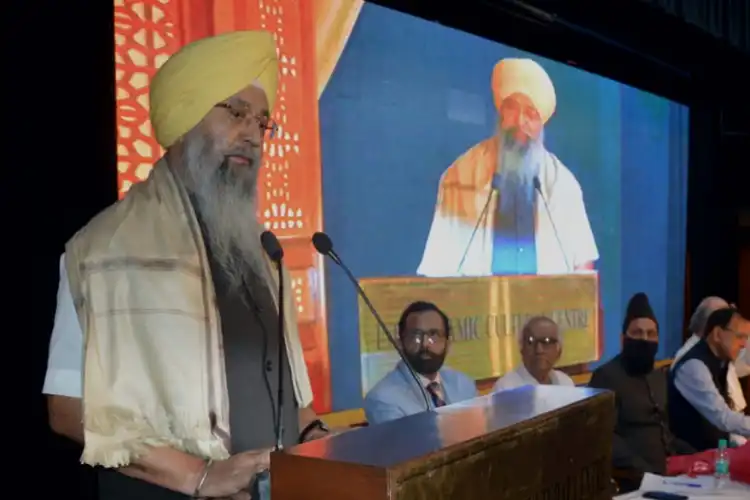
New Delhi
The Chairman of the National Commission for Minorities Iqbal Singh Lalpura said about the Prophet of Islam Muhammad: “In this day and age, it is too difficult to be a true Muslim, because the prophetic teachings require a Muslim to exercise utmost patience, restraint and forbearance. To be a true follower of the Prophet is easier said than done”, he said.
He was speaking on the Conference on Prophet’s life organized by the India Islamic Cultural Centre (IICC) on the last day of Rabiul Awwal (the third month of Islamic Calender) at the annual Milad-un-Nabi Celebration. Noted Islamic scholars including Prof Akhtarul Wasey, Comparative Religion Scholar M. H. Qureshi, Maulana Muhibbulla Nadwi (Imam of Jama Masjid) and Indo-Islamic scholar and columnist, Ghulam Rasool Dehlvi spoke on various aspects of the holy Prophet’s life and legacy.
Lalpura said the “real tribute to Prophet would be to put his beautiful teachings and traditions into practice.”
Speaking on the national scenario, Lalpura said that the nation has been built by the freedom fighters and leaders of all communities, including the minorities of India.
“Our elders have rendered great contributions to the liberation, national integration and empowerment of our country. This country, in which religious minorities including the Muslims, Christians and Sikhs have all lived peacefully for centuries, does not belong to any single community, he said.
Quoting from Guru Granth Sahib, Lalpura stressed the universal values of Islam and Sikhism and the striking similarities between the two faiths. “I, as a Sikh, strongly believe that the Prophet of Islam has greatly inspired our spiritual masters and our predecessors. The Prophet’s life and teachings have much to offer to us to live in peace and harmony and end the growing religious discord and communal conflict in the country,” he said.
Prof. Akhtarul Wasey shed light on the role of the Prophet’s wives in setting examples for the empowerment of women. “While Hazrat Khadija was a glaring example of economic empowerment for Muslim women, Hazrat Aisha emerged as the greatest educator, teacher and narrator of hadith traditions. Similarly, Hazrat Umm-e-Salma was an icon of political empowerment of women in Islam and almost all the Sahabiyaat(female companions) of the Prophet serve as models of spiritual empowerment for our sisters and daughters today,” he said.
Prof. M. H. Qureshi dwelt on the scriptural similarities between Islam and Hinduism in terms of their essential message of Monotheism (Tawheed) and the universal and egalitarian values embedded in their texts.
He quoted from both the Qur’an and Vedas to substantiate his key point that Muslims and non-Muslims need to come together to develop a deeper understanding of each others’ religions, precepts and practices. If they do so, a lot of misconceptions and prejudices will vanish from their minds.
“Unity, equality and brotherhood of mankind are the essential messages of Islam and all other religions in India that we need to re-rediscover and promulgate in Indian society to preserve our shared heritage and protect the common good”, he said.
Ghulam Rasool Dehlvi spoke on the “Prophetic Mission and Mysticism” drawing attention to the moral, ethical and spiritual dimensions of the Prophet’s life. He highlighted the Prophet’s noble personality traits in both pre-prophethood and post-prophethod periods and his pursuits for peace in both Mecaan and Medinite phases, calling them the brightest sides of the Prophetic Persona that need to be revived and rejuvenated on every occasion of Milad-un-Nabi.
Quoting from the Sirah literature, he stated: “From the Prophet’s key role in the formation of Hilf-ul-Fudul—an alliance for peace and justice through a collective action which was created by the Meccans in 590 AD—to the Peace Treaty of Hudaibiyyah (Sulh-e-Hudaubiyyah), and from the enactment of Misaq-e-Madina or Covenant of Madina, which was written as a constitution or charter of human rights, to the Conquest of Mecca (Fath-e-Makkah, the holy Prophet emerged as Peace-Maker for mankind”.
The best part of the Prophetic Mission was that he reformed and civilized a Bedouin society which was deeply steeped in the pre-Islamic Jahiliyyah. He urged them to shun all forms of violence, retaliation and vengeance. A true Muslim in the sight of the holy Prophet is the one from whose hands and tongue all other people are safe, Dehlvi explained.
Dehlvi said from this conference a message of peace-building was the cornerstone of the entire Prophetic mission must go across to people. Those who are swayed by extremist frenzies and radical rhetoric in the name of protecting of honour of the Prophet are the false claimants of His lovers (Ashiqaan-e-Rasool).
He said, “Today, if someone goes berserk and beheads a human being, shouting the extremist slogan of “Sar Tan Se Juda” (separating head from body is the only answer to the insults against the holy Prophet), he is actually the biggest blasphemer who brings disrepute to the holy Prophet.
ALSO READ: Pak LeT continues to use web to rope in Kashmiri kids into terrorism: SIA
Guest panelists and participants in this event included the famed Egyptian scholar on Urdu language and literature, Dr. Walaa Jamal El Esseily who recited her Urdu poetry; Urdu poet Mateen Amrohavi and Maulana Muhibullah Nadvi, and Abrar Ahmed, Secretary. IICC.
